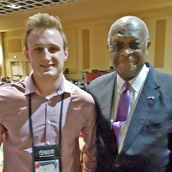 Throughout my first months at of medical school, I have been very struck by the impact the current healthcare system and costs have on physicians and patients. Many doctors feel limited in what they can do for their patients due to costs, while patients are often faced with difficulties accessing healthcare due to the price and time needed for treatment.
Throughout my first months at of medical school, I have been very struck by the impact the current healthcare system and costs have on physicians and patients. Many doctors feel limited in what they can do for their patients due to costs, while patients are often faced with difficulties accessing healthcare due to the price and time needed for treatment.
This past year, I experienced these difficulties first hand when I purchased my own insurance. I spent a gap year working in my family’s restaurant and was making too much money to be covered by their insurance plan. As such, I bought my own through the ACA’s Health Insurance Marketplace. The experience was confusing, time consuming, and opened my eyes to the many barriers preventing people of different backgrounds from obtaining healthcare.
Through the generosity of the Benjamin Rush Institute, I was able to attend the Docs for Patient Care Foundation’s (D4PC) conference on Direct Primary Care to learn about one solution for our current healthcare system. Through a non-insurance direct payment agreement with a physician, DPC allows patients better access to their doctors, while avoiding the high, debilitating premiums often associated with medical care. Physicians, on the other hand, can focus on being an advocate for their patients without being tied down to the bureaucracy often associated with our healthcare system.
Perhaps the most striking thing of the entire experience, however, was just how happy the direct primary care doctors were.”
Perhaps the most striking thing of the entire experience, however, was just how happy the direct primary care doctors were. I have seen many physicians who are burnt out due to the problems in our current healthcare system. Many regret entering the profession and would not recommend it to their children. In contrast, the DPC doctors I met at the conference had an optimistic outlook on life and their careers. Many commented on how direct primary care allows them to build quality relationships with their patients and treat the person as whole, not just when sick.
I was also very inspired to see the entrepreneurial spirit of the direct primary care doctors—most who own their own practices and are excited for the growth opportunities before them. While direct primary care is not currently available in my home state of Wisconsin, I foresee a bright future for this style of care because of the quality of care it allows for patients and the inspiring physicians practicing it.

The opportunity to learn about healthcare policy from leaders like Herman Cain and Grace-Marie Turner was truly a special experience, and I hope to carry theirpassion for improving our healthcare system with me as I begin my journey in medicine.
